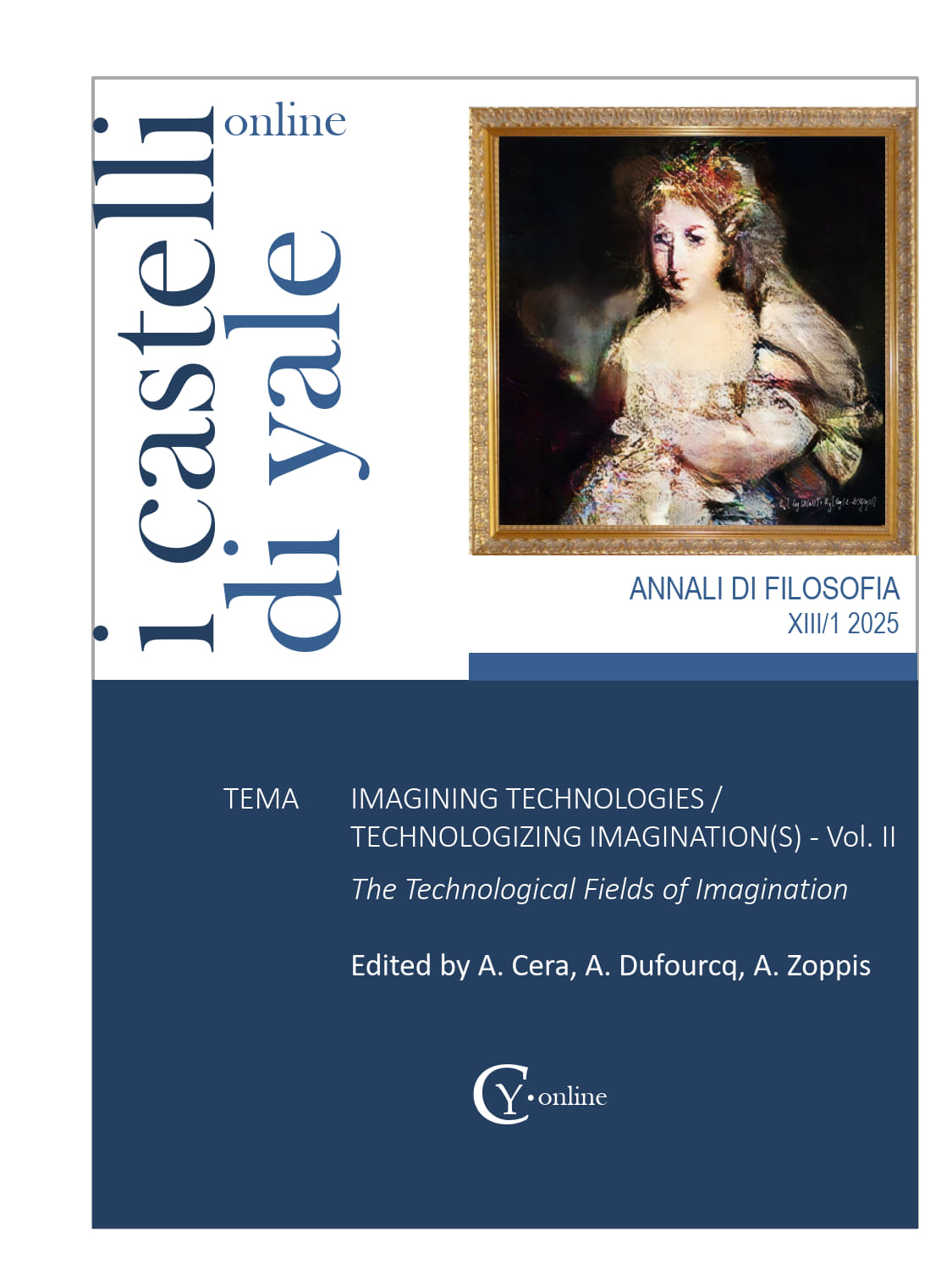The Bubble: The Dark Side of Technical Imagination
DOI:
https://doi.org/10.15160/2282-5460/2838Parole chiave:
Bubble, Memory, Culture, Hyper-industrial Age, Time, ImaginationAbstract
We live in a bubble – the bubble of “contemporaneity”. It is often claimed that “everything is cyclical”, as taste and fashion recycle elements from the past, presenting them as “original”. However, this is largely an illusion. Contemporaneity has a distinct starting point: the 1950s. What appears to be a transgenerational community sharing cultural references and cultivating a global collective memory is, in fact, the illusory effect of a «homogeneous, empty time» (Benjamin). In this article, I diagnose the contours of what I call “the Bubble” and the risks it entails, critically examining the role of technical reproducibility in the (mis)formation of memory. I argue that both individual and collective memory are shaped by the economic forces and neoliberal ideology of global capitalism, leading to what Stiegler termed «symbolic misery» – the collective impoverishment and homogenization of taste, alongside the «modulation of affects» (Deleuze). These processes are facilitated by two key mechanisms: the encapsulation of experience via technical means (prosthetic memory) and the restriction of experience through the controlled distribution of cultural objects (e.g., algorithms). Thus, the bubble of contemporaneity emerges not only as a cultural phenomenon but also as an instrument of control and standardization within late capitalism.
Riferimenti bibliografici
Adorno, T. (2001). The Culture Industry: Selected Essays on Mass Culture. London & New York: Routledge.
Assmann, A. (1999). Erinnerungsräume. Formen und Wandlungen des kulturellen Gedächtnisses. München: C.H. Beck.
Assmann, A. (2008). Canon and Archive. In A. Erll & A. Nünning (Eds.), Cultural Memory Studies (97-107). Berlin: De Gruyter.
Assmann, J. (2011). Cultural Memory and Early Civilization: Writing, Remembrance, and Political Imagination. Cambridge: Cambridge University Press.
Benjamin, W. (2007). Theses on the Philosophy of History. In Illuminations. Engl. Trans. H. Zohn. (253-264). New York: Schocken Books.
Deleuze, G. (1995). Postscript on the Societies of Control. In Negotiations. Engl. Trans. M. Joughin. (177-182). New York: Columbia University Press.
Derrida, J. (1982). Margins of Philosophy. Engl. Trans. Alan Bass. Chicago: University of Chicago Press.
Derrida, J. (1997). Of Grammatology. Engl. Trans. Gayatri Chakravorty Spivak. Baltimore and London: The Johns Hopkins University Press.
Erll, A. (2011). Memory in Culture. Engl. Trans. S. B. Young. London & New York: Palgrave Macmillan.
Halbwachs, M. (1980). The Collective Memory. Engl. Trans. F. J. Ditter & V. Y. Ditter. New York: Harper & Row.
Halbwachs, M. (1992). On Collective Memory. Engl. Trans. L. A. Coser. Chicago & London: The University of Chicago Press.
Horkheimer, M. & Adorno, T. W. (2002). Dialectic of Enlightenment: Philosophical Fragments. Engl. Trans. E. Jephcott. Stanford: Stanford University Press.
Husserl, E. (1991). Lectures on the Phenomenology of the Consciousness of Internal Time from the Year 1905. In On the Phenomenology of the Consciousness of Internal Time (1893-1917). Engl. Trans. J. B. Brough. (3-103). Dordrecht: Kluwer.
Jameson, F. (1991). Postmodernism, or The Cultural Logic of Late Capitalism. London & New York: Verso.
Jameson, F. (2003). Future City. New Left Review, 21, 65-79.
Justice, C. (2010). Ronald Reagan and the Rhetoric of Traveling Back to the Future: The Zemeckis Aesthetic as Revisionist History and Conservative Fantasy. In S. Ní Fhlainn (Ed.), Worlds of Back to the Future (174-194). Jefferson (NC): McFarland & Company.
Leroi-Gourhan, A. (1993). Gesture and Speech. Engl. Trans. Anna Bostock Berger. Cambridge, Mass.: MIT Press.
Loeve, S. et al. (2018). Is There a French Philosophy of Technology? General Introduction. In S. Loeve, X. Guchet & B. B. Vincent (Eds.), French Philosophy of Technology. Classical Readings and Contemporary Approaches (1-20). Cham: Springer.
McCarthy, E. (2010). Back to the Fifties! Fixing the Future. In S. Ní Fhlainn (Ed.), Worlds of Back to the Future (133-156). Jefferson, NC: McFarland & Company.
Mendoza‑Canales, R. (forthcoming). Short-Circuits of Memory: Individuation and Imagination in Hyper-Industrial Societies. In A. Oraldi & T. Caraus (Eds.), Which Smartness? Whose Intelligence? Critical Perspectives on Digital Technology and Political Subjects. Cham: Springer.
Ní Fhlainn, S. (2010). Introduction: It’s About Time. In Worlds of Back to the Future (1-28). Jefferson (INC): McFarland & Company.
Oraldi, A. (2024). Phantasy, Technology, Critique. On Bernard Stiegler’s Pharmacology of the Imagination. I Castelli di Yale, XII (2), 109-122 (https://doi.org/10.15160/2282-5460/2921).
Priewe, M. (2017). The Power of Conformity: Music, Sound, and Vision in Back to the Future. European Journal of American Studies, 12 (4), 1-12 (https://doi.org/10.4000/ejas.12409).
Prince, S. (Ed.) (2007). American Cinema of the 1980s: Themes and Variations. New Brunswick (NJ): Rutgers University Press.
Simondon, G. (2020). Individuation in Light of Notions of Form and Information. Engl. Trans. T. Adkins. Minneapolis & London: University of Minnesota Press.
Sloterdijk, P. (2011). Spheres. Volume I: Bubbles. Microspherology. Engl. Trans. W. Hoban. South Pasadena (CA): Semiotext(e).
Sloterdijk, P. (2016). Spheres. Volume III: Foams. Plural Spherology. Engl. Trans. W. Hoban. South Pasadena (CA): Semiotext(e).
Stiegler, B. (1998). Technics and Time, 1: The Fault of Epimetheus. Engl. Trans. R. Beardsworth. Stanford (CA): Stanford University Press.
Stiegler, B. (2008). Technics and Time, 2: Disorientation. Engl. Trans. R. Beardsworth. Stanford (CA): Stanford University Press.
Stiegler, B. (2011). Technics and Time, 3: Cinematic Time and the Question of Malaise. Engl. Trans. S. Barker. Stanford (CA): Stanford University Press.
Stiegler, B. (2013). What Makes Life Worth Living: On Pharmacology. Engl. Trans. D. Ross. Cambridge: Polity Press.
Stiegler, B. (2014). Symbolic Misery, Volume 1: The Hyper‑Industrial Epoch. Engl. Trans. B. Norman. Cambridge: Polity.
Stiegler, B. (2022). Bernard Stiegler: Elements of Pharmacology. An Interview with Felix Heidenreich and Florian Weber‑Stein. In F. Heidenreich & F. Weber‑Stein (Eds.), The Politics of Digital Pharmacology: Exploring the Craft of Collective Care (85-116). Bielefeld: Transcript.
Downloads
Pubblicato
Fascicolo
Sezione
Licenza
Copyright (c) 2025 Ricardo Mendoza Canales

Questo lavoro è fornito con la licenza Creative Commons Attribuzione - Non commerciale - Non opere derivate 4.0 Internazionale.


